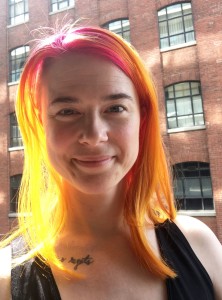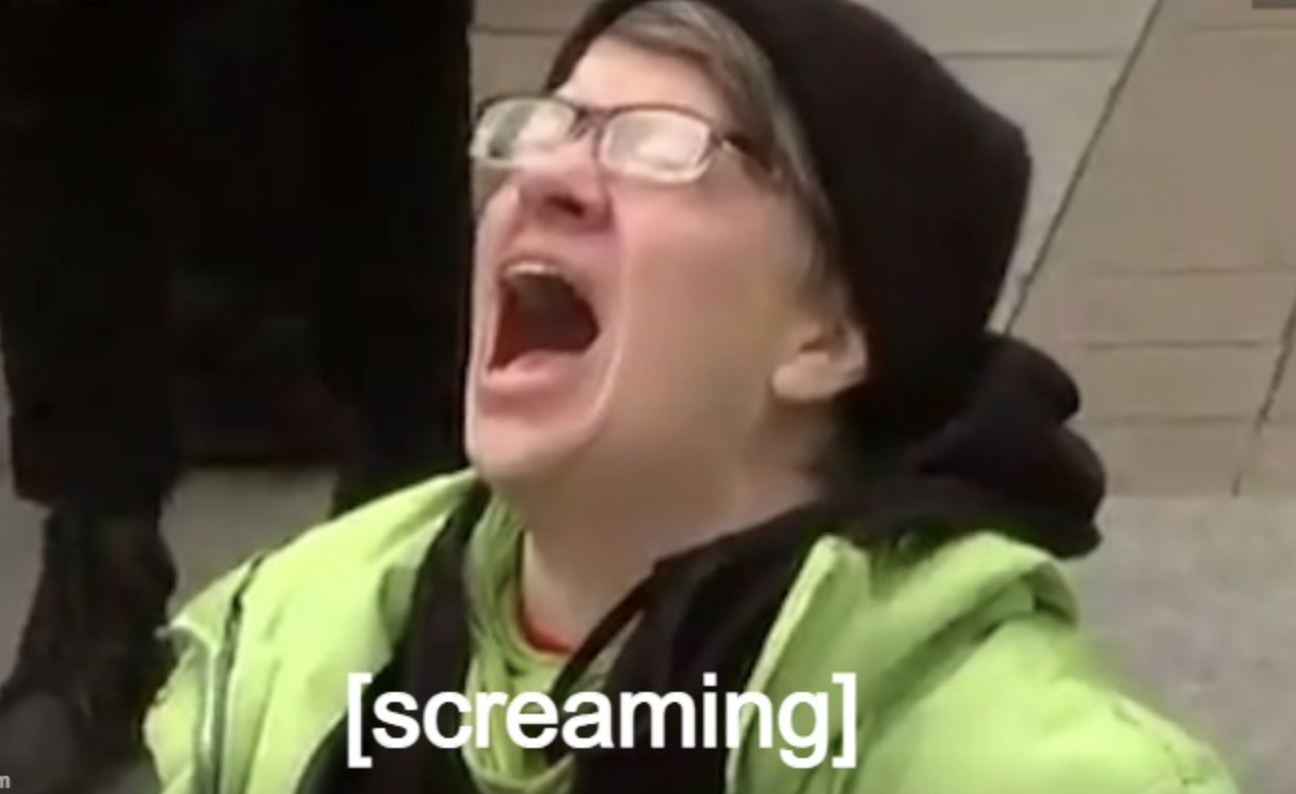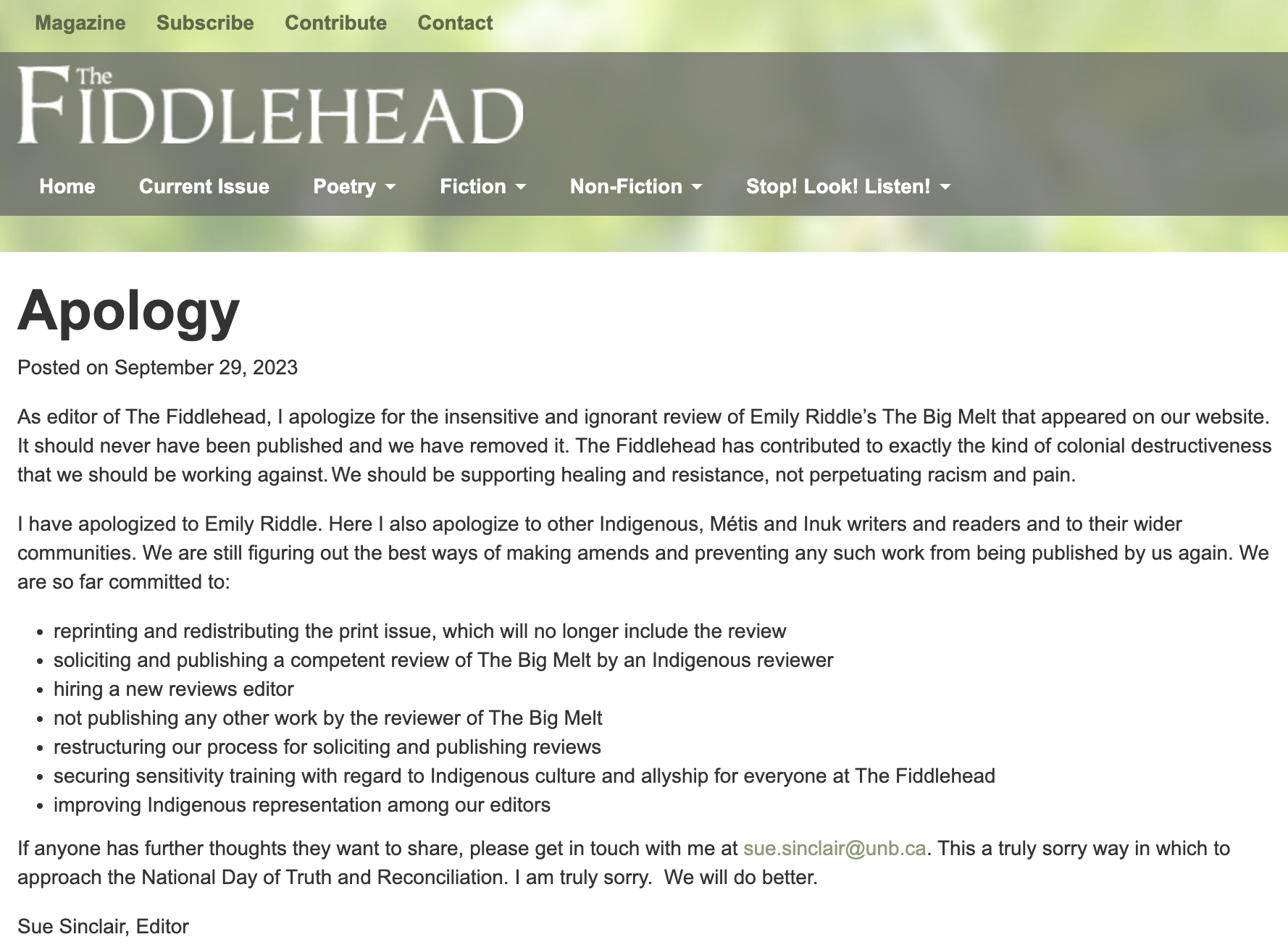Sarah L. Taggart has published in The Malahat Review, The Fiddlehead, Journey Prize Stories and a Winnipeg zine called 1234V. She has some degrees and has lived a lot of places and has worked many jobs (never as a lumberjack, though) and currently calls Toronto home. She lives with a damn cute dog and an even cuter partner.
Sarah Taggart is a meat popsicle. So says the “Intro” section on your Facebook page. What could this possibly mean?
1. A resistance to providing too much personal information in a public format?
Yes.
2. A rejection of overshare culture typical of Facebook?
Also yes.
3. Self-deprecatory humour?
Never.
4. The hard recognition of the reality of being one of 7.5 billion carbon units on this planet?
Hm, maybe?
5. I made the mistake of googling “meat popsicle”, and now I have to factor in the connection to Luc Besson’s Fifth Element and possible references to cryogenics. There’s no limit to how deep that hole goes.
So? What gives? It’s number 5. The Fifth Element is one of my all-time favourite movies. I’ve never before considered the cryogenics angle, although I should have considering what’s going on in the movie when that line is uttered (if you haven’t seen it, see it!). Honestly, what do people even put in their Facebook “Intro” sections? Facebook is not typically where I go to inform strangers about myself; it’s where I go to hang out electronically with people I already know.
“In my opinion, anyone, anywhere, should be encouraged to imagine other peoples, other cultures, other identities,” he wrote. “I’d go so far as to say there should even be an award for doing so – the Appropriation prize for best book by an author who writes about people who aren’t even remotely like her or him.” Doing so could help Canadian literature shed its “exhaustingly white and middle class” identity, he added. “Get outside your own head. Relentlessly explore the lives of people who aren’t like you, who you didn’t grow up with, who don’t share your background, bank balance and expectations. Set your sights on the big goal: win the Appropriation prize.”
That’s a quote from a May 13, 2017, article in The Guardian about the appropriation prize scandal. You can see Hal’s intention, but intention is quite irrelevant when a wall of hatred comes down on your head. You can always tell by the lengthy apologies, resignations, and damaged careers, just how high and heavy that wall was. It kills me, by the way, how Hal had to apologize for some controversial yet well-intentioned comments just to make the beatings stop.
Are we approaching a point at which your subject matter as a writer is restricted to your personal identity and whatever you have personally experienced?
No, never. For one, people cannot help but want to write about what they don’t know, what they don’t understand. Some people write in order to make sense of “the other.” And, I believe that a person can write about experiences outside their own world. However, they have to do it respectfully and with extreme awareness. That’s kind of where all of these asshats missed the point, I think, with this “scandal.” I don’t like the word “scandal” by the way. It’s too flashy. This was such an important conversation to have and calling it a scandal makes it sound juicy and hot-headed. So, respectful awareness. What does that look like? Well, let’s look at your next question.
You’ve done a great job of writing as a male in “The Way It Is In A Place Like This” (Short Fiction Honourable Mention, Fiddlehead 267), but will we reach a point where this is considered incorrect? I know the appropriation debate currently centres on race, but couldn’t it easily apply to gender, class, occupation?
Thanks. Glad I could write as a man. And unless the earth tilts off its axis and thousands of years of white patriarchy just, like, stop informing and influencing the everyday lives of women, femmes, people of colour and other marginalized people, it will never be a problem for a white, cis woman to write as a white, cis, straight man. It’s perhaps technically appropriation, but it’s not the appropriation that’s at issue here. I am writing, for lack of a better word, up. I am writing about the person at the top of the ladder. I have to check my privilege when I decide to write about someone who is more marginalized than I am. Do I write as a person of colour? Do I write about abject poverty, about a different country, about (dis)abilities I know nothing personally about?
You can write about a strip club, but can I? It might be a delicate dance avoiding that misogynist stamp simply for touching on that subject.
Instead of asking, “Can I?”, what about asking, “Should I?” What about asking, “Is this a story that needs to be told by me? Or can I tell a story that is more genuine, more honest?” If the answer is yes to the former, then you go ahead and write about that strip club! I’m remembering now how hard it was to write a few decent sentences about pole dancing from the perspective of someone who knows nothing about how fucking hard pole dancing is.
Am I being overly sensitive and paranoid about the extent to which social justice warriors have infiltrated all universities, schools, workplaces, and social networks?
Yes, I think you are.
Your story seems to be the perfect example of Hal’s call to “explore the lives of people who aren’t like you”. First, it’s from the point of view of a dude, but it’s also about people of a different…um, gotta tiptoe here…a different class? I’m just guessing, but I doubt that’s how you roll on an average weekend?
Well, class is a tricky word. Class says “money” to me and some of the guys in my story make decent money, make a good wage. They make a lot more than most writers. And I’ve spent some time at strip clubs, again possibly more time than some of the men in my story. Remember, they’re here for a bachelor party. This is a special occasion. But, you’re right, I don’t drink or fight that much, and I have more education than they do, and I live in a more urban space, and spend my time with more left-wing intellectuals with puppies than they do. Probably.
However, I’ll reiterate that what’s wrong with Hal’s call to arms is that he’s calling us to trample on stories we’ve already been trampling on since we could tell stories. This is not one of those trampled-on stories. A few white doods celebrating a bachelor party at a strip club is not a story that needs to be told by a white, cis, middle/working-class man. I can tell that story.
I’ve known guys like the ones in your story, rough island boys from Nanaimo or Victoria, who’d go to the bar and use their girlfriends as bait, trolling for disrespectful comments from others, looking for the faintest excuse to start a fight. I’ve known guys who seem to express their love for their buds by showing up at 3:00AM to lay a beating on some guy who wronged some other guy. It’s hard to avoid being judgmental, but you seem to have avoided that with your story. Roughness is matched with plenty of tenderness and love.
Blind, two-dimensional rage isn’t particularly interesting. What’s interesting is the grey. When love meets hate and anger, when a conflict is complex, when it hurts too much, demands too much selflessness to do the right thing so you do the wrong thing, fully aware that you’ve fucked up. If I met these guys in passing, I’d probably think they were a bunch of dicks and want nothing to do with them. I mean, the fight itself would just enrage me. And frighten me! Their false heroics, their simple-mindedness. But I wrote these men, I know them from the inside out. Fiction allowed me this. And once I got inside, I discovered that I loved them all. I love these men. That’s why I love fiction. I get to love so many people I might otherwise find distasteful.
I’m most interested in things that are farthest away from my own life and experience.
This is why you’re worried about the current state of literary affairs!
How about you?
I guess it depends on what you mean from furthest from your own life and experiences. Geographically, I write about Canada most of the time, places I’ve been. I usually write contemporary although sometimes I go back a few years, or a few dozen. Right now, I’m writing a novel close to my heart and experience in some respects and then in other parts very outside of it, and I’m wrestling right now with how I’ve appropriated voices I’m not sure I have the right to write. Basically, I write about ordinary people encountering extraordinary circumstances, which basically describes me and my peers and my upbringing. I find that I like to write about things I know because I am so fascinated with the drama of everyday life.
I wonder what you think about momentum. I’ve always thought that at a certain level of publishing credits, or after a particular contest win, I’d experience momentum in my career, wins would come more frequently, everything would get easier. For myself, there is no momentum, and I don’t know why I ever thought there would be. It seemed logical? Perhaps there are only tiny, incremental steps forward. I do believe, however, that there is such a thing as social momentum, and that with a critical number of advocates, supporters, and connections, good things start to happen. What do you think?
I think you’re right. Publishing is about connections, right, so if the right someone knows you, that makes a big difference. However, I think social momentum only gets you so far. The most successful writers I know are the ones who work really fucking hard and have incredible talent. Investment in social connection is a good tack if you are a good writer who works pretty fucking hard, because you’ll need that leg up.
What has been your experience?
My experience has been that I am too much of an introvert to gain social momentum and I am too lazy to work really fucking hard so maybe I will never be a successful writer? Oh, shit.
What are you doing in Toronto?
I came here for fame and fortune in publishing (on the operations/editorial side), found it, discovered that’s not actually what I wanted, fell in love, and am still here because my love is still here!
Are you concentrating on writing full-time?
What is full time? How do you do that? I’d love to write full time.
Is it important to you that any supplemental employment be writing related?
I waffle on this. I’ve done both and everything in between. I have part of a master’s degree in publishing and I thought for a long time that I would work in publishing and be a writer. But publishing really kicked my ass the past few years, so maybe that’s not for me. I’ve worked in finance, in mental health, for a dating website, in academia. Sometimes I managed to slip writing into jobs that were not originally designed that way. I think it’s important for me to bring effective communication into whatever work I do. That might be as minimal as getting asked to proofread the annual reports.
Toronto seems to be the hub of Canada’s publishing industry. How does one infiltrate the writing scene?
Infiltrate! Haha.
Do you attend industry events, readings, launches?
No. (see above re: introversion)
How do you go about this?
I don’t. (social momentum=zero)
What are the benefits of publishing in journals?
I think the journal is a perfect time capsule of what’s good right now, and, if it’s a good journal, if it’s edited well, what’s good right now from a variety of voices. You’re reading the zeitgeist. If you’re publishing in journals, you’re a voice in that zeitgeist.
Does it make more sense to concentrate exclusively on pumping out books?
If you have that privilege, do it! I haven’t managed to pump out a book, let alone multiple books.
What has been most effective in the promotion of your work?
Um. Uh. Gosh, I have no idea. How did you find me? I don’t know that I’ve ever effectively promoted my work.
With respect to the writing industry, you said our journeys were similar. Care to elaborate?
Good question. What the heck did I mean? I guess I meant that you and I have been writing for a long time and had some good success but haven’t hit the big time (i.e., giant publishing contract). Maybe. I think I didn’t realize just how much you had published. Which is, in some ways, more impressive than the big ticket book contract. Maybe it’s just that we have both lived in Burnaby and Victoria.





Leave A Comment